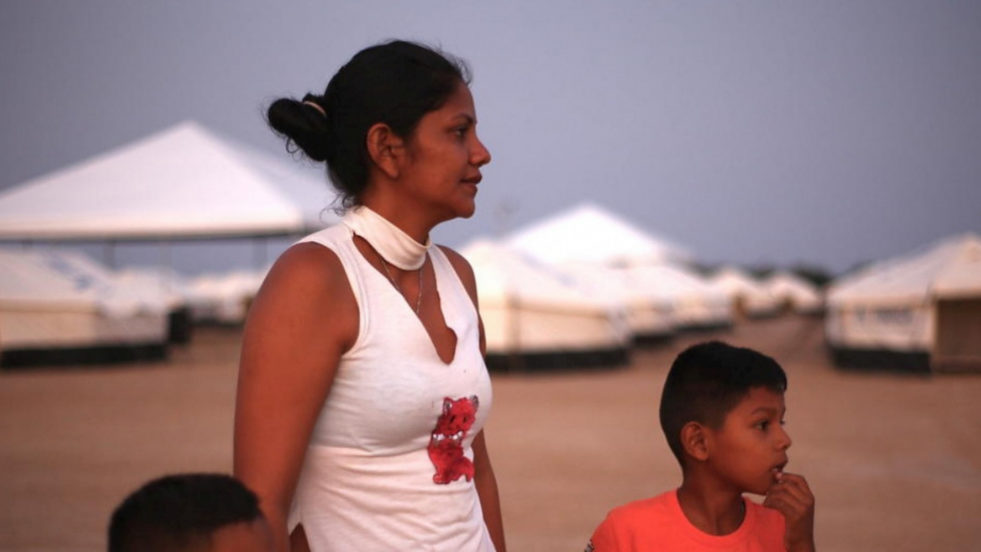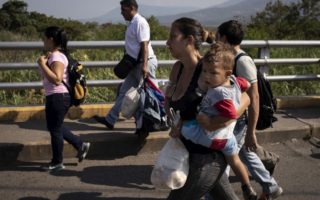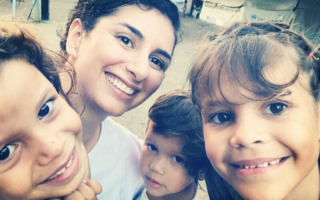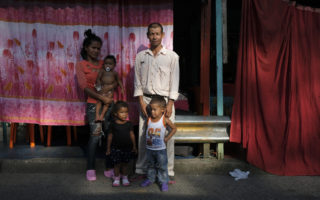
Venezuelan asylum-seeker Darlys and her children arrive at the new reception centre in Maicao, Colombia.© UNHCR/Jorge Daniel Berdugo Siosi
Darlys and her children were among the thousands of Venezuelans exposed to serious risks in Maicao. A new reception centre offers temporary housing for the most vulnerable.
By Marco Rotunno in Maicao, Colombia
When Darlys* fled Venezuela with her two children looking for safety, she never imagined she would end up sleeping on the streets of Maicao, a Colombian city near the northern border.
Darlys had no option but to leave Venezuela because the life of her seven-year-old son, Luis, was at risk: His kidney disease was reaching a critical point, and treatment in her home country was not available.
Like Darlys, thousands of families from Venezuela who reach Maicao do it with very few means to survive, if anything at all. Many of them have been living in the streets for months – in parking lots, under the city’s arcades or under self-made shelters – because the city’s shelter capacity is very limited.
With a population of around 100,000, Maicao currently hosts 30,000 refugees and migrants. An assessment conducted by UNHCR, the UN Refugee Agency, in February revealed that half of the 3,500 Venezuelans interviewed were living in the streets or in informal settlements in and around the city.
“Here I am not afraid of falling asleep at night. Here we feel safe.”
Darlys tried renting a small flat at first, but her money ran out within a few weeks. “I had to choose between paying rent or feeding my children,” she says. They went back to the streets.
Every night, Darlys was afraid of falling asleep. She wanted to stay awake to protect her children, fearing that someone might take them away from her or hurt them. “I had a knife, and some nights I was holding it while I was sleeping so that I could protect my kids and our belongings,” she says. “Many people were being robbed at night.”
Refugees and migrants living in the streets of Maicao have little access to drinking water, bathrooms, shelter and other basic needs. They are also exposed to serious risks like human trafficking, sexual and gender-based violence (SGBV), labour exploitation and sexual exploitation.
At the end of 2018, Maicao’s local authorities and the Colombian government asked UNHCR for support to set up a temporary reception centre to help address the lack of accommodation for so many people in need.
The Integrated Assistance Centre, which opened its doors in early March, has an initial capacity to host 350 people. Women, children, elderly and other vulnerable people now have temporary access to shelter, food, water, basic medical care, and other services, such as legal orientation, psychosocial and child support.
Due to their vulnerability, Darlys’ family was among those selected to be sheltered in one of the 62 tents now available at the centre, three kilometres from Maicao. In the breezy dining room, the family took a break from the heavy sun and enjoyed a dish of beef stew and rice.
Once inside the tent, Darlys’ children could not believe it when they saw a proper mattress with pillows. “They are so relaxed now, and me too,” she said.
Government agencies, international and national non-governmental organizations, as well as UN agencies such as the World Food Programme and the World Health Organization, are involved in the centre’s operations.
“The centre opened due to the critical situation in Maicao, especially the high number of people living in the streets,” says Federico Sersale, head of UNHCR’s office in La Guajira department. “It aims to address the extremely vulnerable conditions of Venezuelans for a limited period of time, helping them make a first step towards a more independent life and future community integration.”
Yarelis*, 35, arrived at the centre with her three kids – her youngest is only 10 months old. She left Venezuela three months ago in shock: Jairo, her 17-year-old boy, was killed in Maracaibo when someone tried to rob him.
“Now it feels like we are all neighbours.”
“He had nothing of value with him, only his mobile phone,” she says in tears. “I was so afraid that my other kids would not survive the widespread violence that I decided to leave our house straight away.”
In the rush, Yarelis did not collect any official documents. But without a birth certificate, children are not able to register for school in Colombia. UNHCR’s legal team at the centre is helping Yarelis to find a way to document her children so that Susana*, her 10-year-old daughter, can finish primary school.
Yarelis’ and Darlys’ are two of the 60 families who have found temporary shelter and a brief respite from hunger, fear and desperation. The needs are still huge: over 3.4 million Venezuelans are living abroad, and Colombia is the country most affected by this outflow, with over 1.2 million Venezuelan refugees and migrants.
The humanitarian needs have overwhelmed the Colombia’s reception capacity. UNHCR is working to strengthen shelter networks, provide legal counselling and facilitate access to food, water, education and health services to people in dire need.
At the centre, Darlys’ life transformed in a matter of days. “When I came here, I only knew two or three people. Now it feels like we are all neighbours,” she says. Under a big blue shade area, the families spend a lot of time together, especially at night: they play cards, chat and watch movies on mobile phones.
Luis is feeling better now. At Maicao’s hospital, Darlys was able to obtain the medicine he regularly needs for his kidney condition and the medical staff at the centre monitors Luis’ health.
Both of her children, Luis and Adolfo, are much happier now. Every afternoon they attend fun activities organized by associations and they have made new friends. She is also saving money for their school fees. “This is what I fight for every day,” she adds. “Their education is paramount.”
“Here I am not afraid of falling asleep at night,” she says. “Here we feel safe.”
*Names have been changed for protection reasons.
Originally published by UNHCR on 15 April 2019





